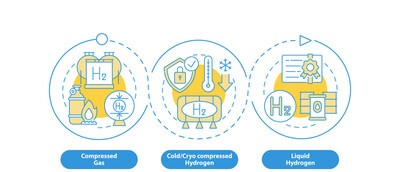
INSPIRATION
The need to develop containers that store hydrogen is crucial for scaling the hydrogen economy. The most usable form of storing liquid hydrogen is in cryogenic tanks, also known as dewars. These containers handle liquid hydrogen at a temperature of -253 C, without leakages, while sustaining purity. There are various types of dewars ranging from Type I to Type IV, depending on the materials in the walls and their
carrying capacity. In addition, compressed gas storage tanks are useful to store high-pressure hydrogen gas. Hydrogen gas is relatively easier to handle in comparison to liquified hydrogen because of the temperature constraints of liquid hydrogen. However, it is not ready to use in industrial applications. Cryo-compressed hydrogen involves high-pressure storage of hydrogen to decrease boil-off upon exposure to the atmosphere, making it cost-effective and easy to handle.
US-based startup Verne develops storage tanks for compressed hydrogen to be used in fuel cell trucks. As compared to traditional fuel cell hydrogen storage tanks, Verne has engineered storage tanks with higher volumetric density and lower weight, enabling hydrogen to be stored at lower pressures. The cumulative results of these changes lead to a safer storage tank that weighs less, is cost-effective, and accommodates higher amounts of hydrogen at each refill.
Greek startup CYRUS designs metal hydride hydrogen compressors (MHC) for transportation applications. The startup has developed a thermal-powered MHC that works by absorbing hydrogen at low pressure and temperature and desorbing it at higher pressure by raising the temperature with an external heat source. These compressors are suitable for operation in RES or industrial waste heat facilities and do
not use critical raw materials. Furthermore, due to zero noise and low ecological impact production, the compressors can be installed in residential areas.




